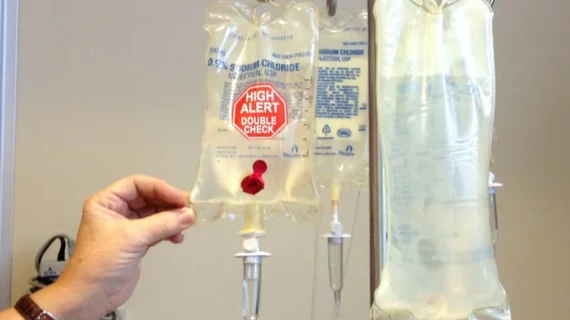CDK2 inhibitors protect cancer patients from anthracycline-induced cardiotoxicity
Inhibiting a certain class of cyclin-dependent kinase (CDK) proteins could protect cancer patients from chemotherapy-induced heart failure—the second leading cause of death in the demographic after cancer recurrence—according to research published in the Journal of Biological Chemistry.
The work, led by postdoctoral research associate Peng Xia and colleagues at Washington State University, explored a solution to the cardiotoxicity often experienced by cancer patients undergoing chemo. While productive, commonly used anthracyclines like doxorubicin, a drug Xia et al. call “one of the most effective chemotherapeutic agents to date,” induce DNA double-strand breaks and the apoptotic death of a patient’s cardiomyocytes.
What that essentially means, Xia and co-authors said, is that while doxorubicin inhibits the growth of cancer cells, it also stunts the healthy multiplication of heart cells. Doxorubicin kills cancer cells by infiltrating them with damaged DNA—DNA that, when introduced to cardiomyocytes, will cause those cells to stop replicating and die, weakening the heart muscle.
The authors said cardioprotective agent Dexrazoxane is an FDA-approved first line of defense against chemo-related cardiotoxicity, but the medication is the only one of its kind and isn’t used much due to worries that it might compromise the antitumor activity of anthracyclines.
Instead, Xia and his team looked at the protein CDK2, part of a family of more than 20 CDKs that are involved in the multiplication and division of different cells, including cancer cells. Researchers have only recently started to explore the idea of CDK inhibitors as a new class of anticancer drugs, and just three have been approved by the FDA.
Xia et al. tracked levels of CDK2 and monitored cardiomyocyte response to doxorubicin in a group of lab mice. Compared to a control cohort, the mice exposed to doxorubicin had increased cardiac muscle cell death and elevated CKD2 activity in their cardiomyocytes.
“Compared with the large amount of information in cardiomyocyte cell cycle progression, much less is known regarding the role of cyclin-CDK complexes in apoptotic death of cardiomyocytes,” the authors wrote. “Somewhat surprisingly, up-regulation of cyclins and CDKs was associated with both myocardial regeneration and apoptosis in failing hearts in mice and humans.”
Related Cancer Therapy Cardiotoxicity Content:
Succeeding with Cancer: Using Imaging to Avoid Treatment-induced Heart Failure
Providers must rethink traditional imaging approaches to prevent cardiotoxicity in cancer patients
CV programs struggling to keep up with growing demand for cardio-oncologists
Machine learning predicts drug cardiotoxicity
Prior cardiotoxicity linked to 30% increased risk of CHF during pregnancy
CV outcomes underreported in pivotal anticancer trials
Genetic variants could be key to identifying chemo-induced cardiotoxicity
T2 mapping may uncover cardiotoxic marker early enough to prevent heart failure
Some chemo drugs might be more heart-safe than others
Cardiac MRI-derived T2 mapping may help heart failure patients
Genetic variant linked to chemotherapy-induced cardiomyopathy
Study calls for better collaboration between cardiologists, oncologists
Cardiac monitoring may protect high-risk breast cancer patients against heart failure
When the researchers treated another group of mice with both doxorubicin and roscovitine, a selective immunosuppressive CDK2 inhibitor, they found those mice’s heart function was, on the whole, preserved. The team confirmed those results in a separate cohort of rats.
“In addition to roscovitine, synergistic antitumor activity has also been observed between doxorubicin and additional CDK inhibitors,” Xia and coauthors said. “Taken together, these findings suggested that inhibition of CDK2 could be a promising strategy to synergistically enhance the antitumor efficacy of doxorubicin while concomitantly alleviating doxorubicin-related cardiotoxicity.”
The authors said their ultimate goal is to determine whether a presently available CDK inhibitor could be adopted for real-world use or whether their team needs to develop a novel inhibitor designed specifically to deflect chemo-related cardiotoxicity.

